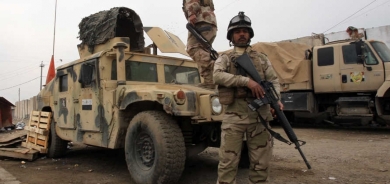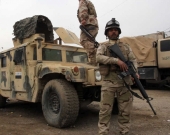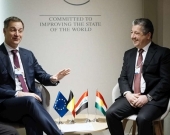How Iraq Explains Why the U.S. Shouldn't Leave Afghanistan

These principles seem to have animated his decision to use force against jihadists in Iraq. The militants, clearly in sympathy with al Qaeda's ideology, would present a danger to the United States if they gained the resources and safe haven of sovereignty. As it is, they already present a danger to U.S. allies in the region, including the Kurds.
In addition, the terrorists "threat[en] to wipe out Yazidis and other religious minorities trapped on Mount Sinjar," according to the New York Times, "add[ing] to the urgency." Despite his obvious and understandable hesitations to return U.S. military forces to Iraq, the president's humanitarian concerns combined with the United States' strategic interests and added heft to his decisions to use force in Iraq.
In other words, the president has articulated the best possible argument for remaining engaged in Afghanistan beyond the 2016 deadline he established for the withdrawal of all U.S. troops there.
The United States has real national security interests at stake in Afghanistan's future and the future of South Asia. Iraq could hardly be a clearer cautionary tale: If the U.S. withdraws before the Afghan security forces are fully prepared to lead the fight against the Taliban and deny safe haven against al Qaeda, jihadists are almost certain to regain safe haven there, much as the Islamic State (IS) has gained ground since the withdrawal of U.S. troops from Iraq in 2011. That is what losing the war in Afghanistan looks like.
But U.S. interests are not limited to a narrow counterterrorism concern. Just as in Iraq, there is the potential for a major humanitarian crisis in Afghanistan following the premature withdrawal of international security forces and development money. If the Taliban continue their resurgence in the wake of the international withdrawal (as noted by the Times here and here), they are likely to engage in reprisal killings against Afghans who allied with the Karzai government or international forces -- including whole tribes who worked en masse with U.S. forces over the years. The ethnic Hazara, whom the Taliban targeted for ethnic cleansing in the 1990s, will face the same fate as the Iraqi Yazidis. The Hazara will be joined by women, Tajiks, Christians, Shia, and the Popalzai and Barakzai tribes.
The United States bears more responsibility for preventing mass atrocities in Afghanistan than in Libya, in which it intervened explicitly and solely for humanitarian reasons in 2011. First, the United States has repeatedly and publicly promised to stand by the Afghans and help them secure their country -- in the 2005 Strategic Partnership Agreement, the 2012 Strategic Partnership Agreement, the 2013 Bilateral Security Agreement, the (presumably) forthcoming Status of Forces Agreement, and the 2012 designation of Afghanistan as a major non-NATO ally -- promises we never made to the Libyans. The Afghans are betting their future on our promises.
Secondly, many Afghans have risked their lives to fight our enemies. Countless Afghans soldiers, policemen, and intelligence agents have fought on the frontlines, and far more of them have been killed than U.S. troops. Nor has their service been simply in defense of their own country: Afghan forces have regularly been a part of broader counterterrorism operations of more concern to us than to them. Their service to our country creates an obligation on our part to help protect them. No such relationship ever existed with Libyan forces.
Third, the United States has a specific and unique opportunity to invest in Afghanistan that rarely exists in other countries facing state failure or mass atrocities. In many cases -- the Congo, perhaps, or North Korea -- the United States has virtually no presence, no resources, or no platform from which to base resources; or the political environment is an obstacle to the introduction of U.S. forces. We can't stop every atrocity in the world, nor should we try.
But in Afghanistan we have a robust infrastructure in place. We have tens of thousands of troops already there. We have a partner in the Afghan government that wants us to stay. None of these things were true in Libya; there are not true in Iraq anymore; they are not true in Syria, Ukraine, North Korea, Mali, or just about any other place on the planet that faces the possibility of a mass atrocity. If there any single place in the entire world where we are most well postured to prevent atrocities where they are likely to occur, it is Afghanistan.
Some critics argue that we've already done everything we can and there is no point to investing any more in a country seemingly impervious to our best intentions. Others argue that the Afghan government's incompetence, paralysis, and corruption excuse our obligation to them. Both are wrong.
Adm. Michael Mullen, then the chairman of the Joint Chiefs of Staff, famously told Congress in 2007, "In Afghanistan we do what we can. In Iraq, we do what we must." When the top military official in the United States openly admits that we did not devote to Afghanistan the resources required to accomplish the mission, there are no plausible grounds for arguing that the United States has done everything it can, and therefore no grounds for arguing that there is no point to further investment. Obama's surge of troops there helped, but did not change, the overall trend of under-resourcing the mission in Afghanistan.
Nor does the Afghan government's corruption erase our obligation to them. It may change how we deliver our assistance, or cause us to place conditions on its use --but to pull out over frustration with the government's kelptocracy would be to punish the Afghan people for the sins of their government. Rather, continued engagement at least gives us the possibility of leverage to use against their corruption, while pulling out gives us nothing.
The president has outlined clear criteria for the use of force abroad: primarily situations in which U.S. interests are at stake, but also those in which humanitarian crises are possible. That is a good standard. Afghanistan clearly meets the standard. That is why two administrations from both parties have repeatedly promised for more than a decade that we will stand by the Afghans. President Obama's decision to withdraw all U.S. forces from Afghanistan by the end of 2016 is inconsistent with his own standard for the employment of force abroad.
BY Paul D. Miller| foreign policy














